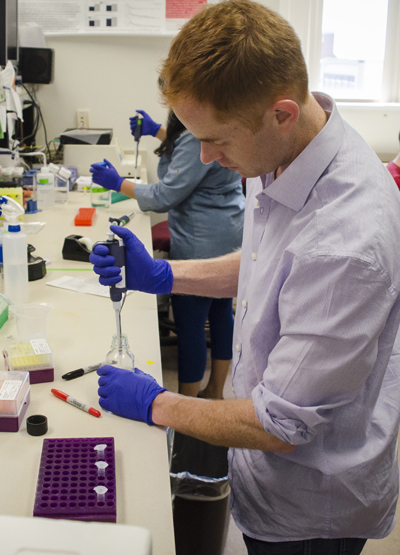From Gravedigger to Rutgers Honors Graduate
Keith Campagno to pursue doctoral degree in pharmacology studying neurodegenerative diseases like Alzheimer’s and Parkinson’s

'Science is not just about being book smart. It takes street smarts and common sense to be a good scientist. What makes Keith so extraordinary is that he has both and he looks at things from different angles'– Bonnie Firestein
A decade ago, Keith Campagno split his time between renovating a house he hoped to sell and digging graves to help pay the bills.
Like many young men just out of high school, Campagno, who grew up in Gloucester County, wasn’t exactly sure what he wanted to do. So, after spending three semesters in college – two at the College of New Jersey and one at Rutgers – Compagno decided in 2000 to drop out. He told himself his hiatus from school would only be for a year or two at most and vowed to spend much of his free time reading books.
“I was paying for college myself and just wasn’t ready for it at the time,” said Campagno, 33, who will graduate from Rutgers with honors this month with a degree in cell biology and neuroscience from the School of Arts and Sciences in New Brunswick and begin a five year program at the University of Pennsylvania pursuing a doctoral degree in pharmacology. Campagno was also accepted into similar programs at Columbia University, UCLA, and the University of Washington, Seattle.
This is the polar opposite of what Campagno was doing 15 years ago. When he decided college – at least at that time – was not for him because he was uncertain what he wanted to do with his life, he worked for nine years as a gravedigger and installed burial vaults for caskets. The money was good and the hours flexible. At the time, that’s what he needed, he said.
“But I knew I would be lying to myself if I said that I wanted to stick around in that job forever, said Campagno who lives in Monmouth County. “I had the option to get out and go back to college and I knew that I had to give it a chance.”
That’s when Campagno says his life changed.
Before dropping out of college Campagno thought he would major in psychology. He was always interested in neuroscience but realized that if he stuck with psychology he would be studying how the brain processes information and not about its molecular structure and how it works.
“I wanted to understand neuroscience from a disease perspective, drug targeting and how we can approach the brain and solve diseases,” said Campagno who has spent 30-40 hours each week, in addition to being a full time student, over the past two years working in Cell Biology and Neuroscience Professor Bonnie Firestein’s laboratory.
Firestein researches the neuronal circuitry in the brain, particularly the nerve endings that allow the nerve cells to communicate. She also looks at the role genes play in brain development which may help to explain the biological process of neurodegenerative diseases like schizophrenia.
Getting a spot in her laboratory, Campagno said, not only helped him academically but also is the reason, he believes, he is on a career path that will enable him to research diseases like Alzheimer’s and Parkinson’s, the two most common neurodegenerative disorders.
“I knew that getting a Ph.D. was something that might be in my future,” said Campagno, the son of a welder and a teacher and the only person in his extended family to go on to graduate school. “But when I went back to school after being away for so long, I couldn’t think about much more than getting that undergraduate degree. That’s why looking at where I am now is just amazing to me.”
His success, however, is not a surprise to Firestein who describes Campagno as focused, driven and smart -- someone who takes ownership of his projects and works as a colleague in the lab rather than as a student intern.
Although Compagno is a little sensitive about being older than the traditional student, Firestein believes that his maturity and life experiences outside of the classroom have helped to shape the way he views science.
“Science is not just about being book smart,” said Firestein. “It takes street smarts and common sense to be a good scientist. What makes Keith so extraordinary is that he has both and he looks at things from different angles.”
Campagno says it is an exciting time for research scientists just starting out because of initiatives like President Obama’s $100 million project to map the human brain to understand and treat brain disorders such as Alzheimer’s and other neurodegenerative diseases.
“We might solve some of the problems associated with aging in our lifetime,” said Compagno. “What I still can’t believe is that I might have the chance to be part of this research. It is something I would have never thought possible until now.”
Click here to read about other outstanding members of the Class of 2015
For media inquiries, contact Robin Lally at rlally@ucm.rutgers.edu